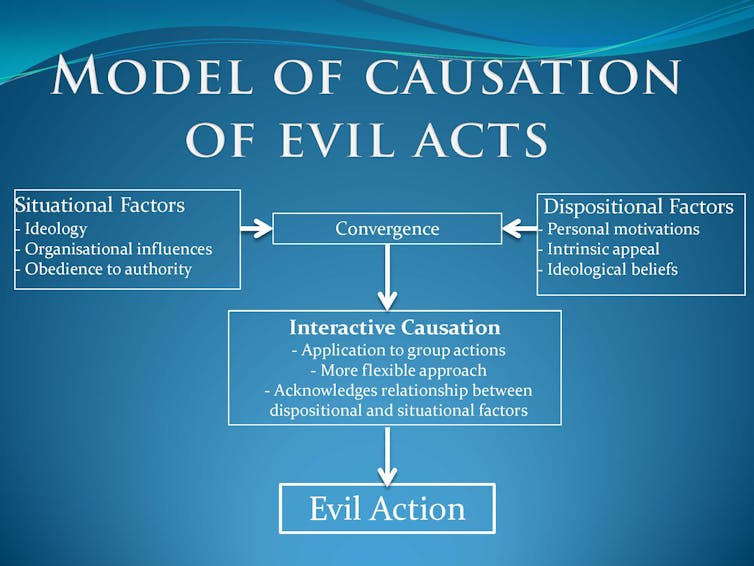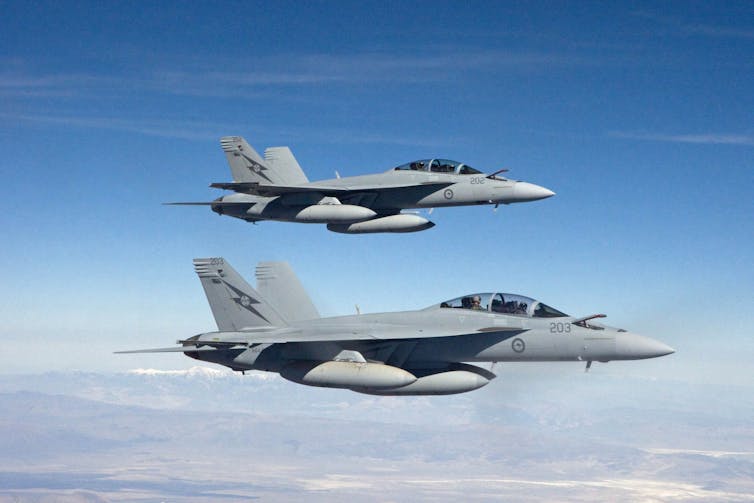Our time, this decade even, has shown us that man’s capacity for evil knows no limits. – Then United Nations’ Secretary-General Kofi Annan, 1997
Over the past few weeks leading up to the US-led bombing of Islamic State (IS, also known as ISIS or ISIL) targets inside Syria, we have heard the term “evil” many times from our political leaders.
IS fighters have been called savage, barbaric, valueless – but what do these words mean to us? Why do people commit evil acts? Does evil have a real meaning or use in helping us understand human behaviour?
These questions and more have fascinated humankind for centuries and we are still struggling to find answers.
Explaining evil in real terms
I believe evil exists. Having studied the war crimes of the German SS in the second world war, I would argue that evil is a realistic concept to describe abhorrent human behaviour.
This is not religious or abstract, but grounded in a sociological or criminological approach to explaining evil acts. I don’t believe in evil people. Rather, as Christopher Browning showed in his study of the Nazis’ “final solution” for the Jews, I believe there are ordinary humans who are capable of committing acts of extraordinary evil.
Realistically speaking, they do this for a variety of rational or non-rational motives. Group pressure, self-interest and the demands of authority influence every decision people make, including those termed evil.
History and social science experiments (for example the experiments of Milgram and Zimbardo) have shown that the overwhelming majority of us are capable of committing evil acts under the right circumstances and pressure. This I call “interactive causation”.

So what form does this type of evil take? What is the nature of evil? As author Adam Morton poses in his excellent review of the concept of evil:
How should we think about the atrocities around us? What concepts do we need, if we are to know how to explain and how to react?
Wrong, bad and evil
Evil is a useful concept to categorise acts that go beyond merely wrong or bad on a continuum of wrongdoing. We tend to use the term evil when acts contain one or more emotive elements. These three elements include:
- the perceived senselessness of the act
- the perceived innocence of the victim
- the uniqueness of the act.
The International Criminal Court has recognised the need to elevate punishment in cases where the victim was particularly defenceless or the crime was carried out with particular cruelty.
Certainly the recent actions of IS fighters against Western hostages and the mass executions of Iraqis would seem to fit easily into evil actions, due to the non-combatant status of the victims and the public and barbaric nature of the killings.
Going to war against IS
It has been the aspect of evil in the actions of IS fighters – particularly the highly-publicised executions of Westerners and other atrocities – that has in no small way galvanised the reaction of Western powers. Politicians including the British Prime Minister and US President have described the movement and its actions as evil.

US Secretary of State John Kerry described IS and its actions in the following terms:
There is evil in this world, and we all have come face to face with it once again. Ugly, savage, inexplicable, nihilistic and valueless evil. ISIL is the face of that evil, a threat to people who want to live in peace, and an ugly insult to the peaceful religion they violate every day with their barbarity.
Australian Prime Minister Tony Abbott has used the term on several occasions to describe IS:
This death cult is uniquely evil in that it does not simply do evil, it exults in evil … This death cult has ambitions way beyond those of any previous terrorist group.
Are we ‘waging war on evil’ or ‘lending humanitarian aid’?
While the labelling of the IS actions has been clear, the language around the international coalition’s response has been confused, to say the least.
US President Barack Obama was roundly criticised when he said he had no strategy to deal with the IS threat. This was rectified to some degree with the announcement of a strategy to degrade and destroy IS, primarily through military force.
Australia has become a partner in this strategy, but there is confusion as to what to call the operation Australia is undertaking. Abbott initially insisted it was a humanitarian mission. Conjecture in the media then turned to what humanitarian aid an F-18 is capable of delivering.
Australian politicians, including Defence Minister David Johnston, have deliberately avoided the use of the word “war”. In contrast, Kerry had no hesitation in labelling the military action an “act of war”.
Despite this indecision, Australia is effectively at war with IS, on the home front and overseas. Having named them as evil so often and so emphatically, the government can hardly turn away from the conflict.
Author: Terry Goldsworthy: Assistant Professor, Criminology, Bond University
Credit link: https://theconversation.com/unique-evil-death-cults-and-war-on-terror-do-these-labels-help-31895<iframe src="https://counter.theconversation.com/content/31895/count.gif?distributor=republish-lightbox-advanced" width="1" height="1"></iframe>

